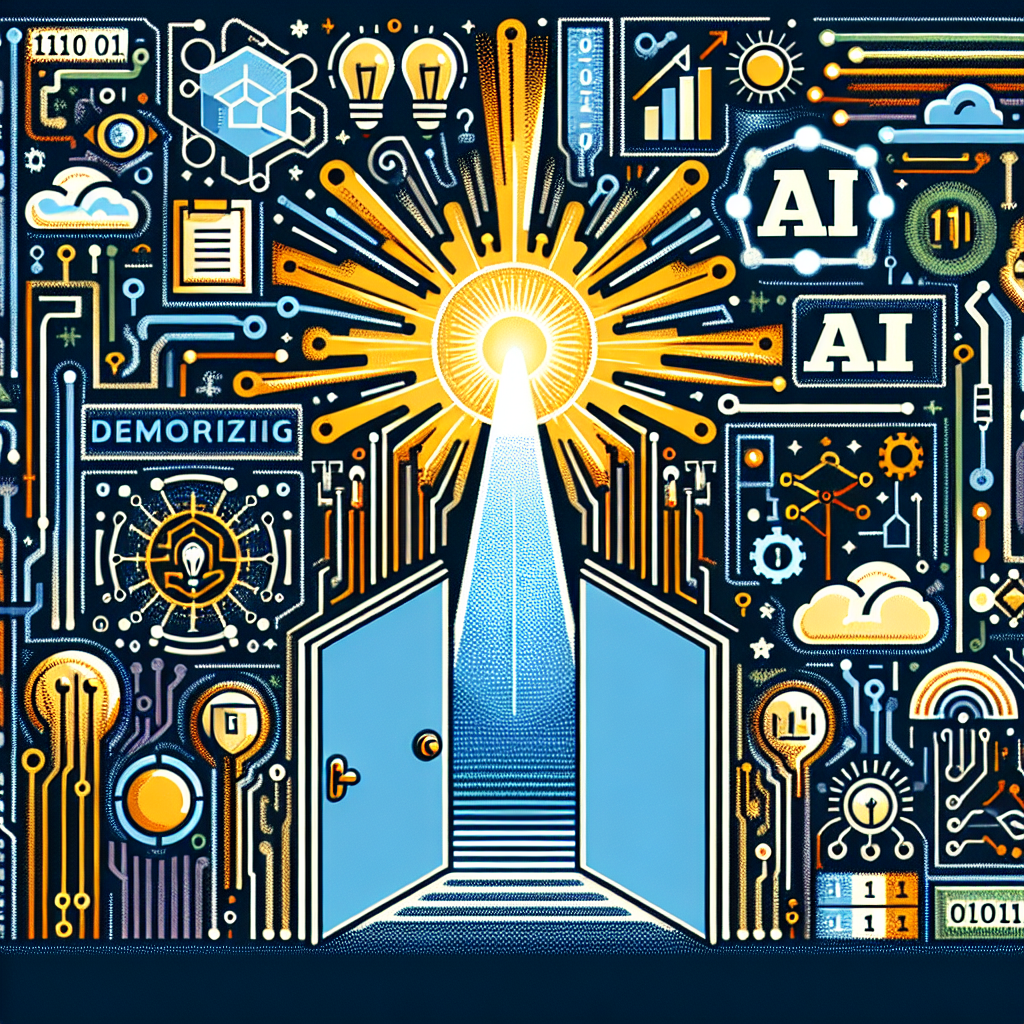Artificial intelligence (AI) has become an integral part of our daily lives, from personalized recommendations on streaming platforms to autonomous vehicles. However, the development and deployment of AI have often been restricted to a select few companies and researchers, leading to concerns about the potential for bias and discrimination in AI systems. Democratizing AI is the process of making AI more accessible to a wider range of individuals and organizations, with the goal of creating a more inclusive future where the benefits of AI are shared by all.
The Need for Democratizing AI
The current state of AI development is dominated by a handful of tech giants, such as Google, Amazon, and Facebook, who have the financial resources and technical expertise to develop cutting-edge AI technologies. This concentration of power has led to concerns about the potential for these companies to monopolize the benefits of AI, while leaving others behind.
In addition, the lack of diversity in the AI workforce has been a major issue, with women and minorities significantly underrepresented in AI research and development. This lack of diversity can lead to biased AI systems that perpetuate existing inequalities and discrimination.
By democratizing AI, we can address these issues and create a more inclusive future where AI technologies are developed and used by a diverse range of individuals and organizations. This can help ensure that AI systems are fair, transparent, and accountable, and that the benefits of AI are shared by all members of society.
The Benefits of Democratizing AI
There are several benefits to democratizing AI. First and foremost, democratizing AI can help ensure that AI technologies are developed in a way that is fair and unbiased. By involving a diverse range of individuals and organizations in the development process, we can help prevent the creation of AI systems that perpetuate existing inequalities and discrimination.
Second, democratizing AI can help foster innovation and creativity in the field of AI. By making AI more accessible to a wider range of individuals and organizations, we can tap into a broader pool of talent and ideas, leading to new and innovative AI applications that benefit society as a whole.
Third, democratizing AI can help promote transparency and accountability in AI systems. By involving a diverse range of stakeholders in the development and deployment of AI technologies, we can help ensure that AI systems are developed in a way that is ethical and responsible, and that the decisions made by AI systems are understandable and explainable.
How to Democratize AI
There are several steps that can be taken to democratize AI and make it more accessible to a wider range of individuals and organizations. One important step is to increase diversity in the AI workforce. This can be done by providing training and educational opportunities to women and minorities who are underrepresented in the field of AI, and by creating a more inclusive and welcoming environment for all individuals interested in AI.
Another important step is to make AI technologies more accessible to small businesses and organizations that may not have the financial resources or technical expertise to develop AI systems on their own. This can be done by providing tools and resources that make it easier for non-experts to develop and deploy AI applications, such as pre-trained AI models and easy-to-use AI platforms.
Finally, it is important to involve a diverse range of stakeholders in the development and deployment of AI technologies, including policymakers, ethicists, and members of the public. By involving a wide range of perspectives in the decision-making process, we can help ensure that AI technologies are developed in a way that is fair, transparent, and accountable.
FAQs
Q: What are some examples of biased AI systems?
A: There have been several high-profile examples of biased AI systems in recent years. For example, a study found that a popular AI-powered recruiting tool was biased against women, because it was trained on a dataset that favored male candidates. Another study found that an AI-powered healthcare system was biased against black patients, because it was trained on a dataset that did not include a diverse range of patients.
Q: How can we ensure that AI systems are fair and unbiased?
A: One way to ensure that AI systems are fair and unbiased is to involve a diverse range of individuals and organizations in the development process. This can help prevent the creation of biased AI systems that perpetuate existing inequalities and discrimination. In addition, it is important to regularly audit and test AI systems for biases, and to take steps to address any biases that are identified.
Q: How can I get involved in democratizing AI?
A: There are several ways to get involved in democratizing AI. One way is to participate in organizations and initiatives that are working to increase diversity in the AI workforce, such as Women in AI or AI for All. Another way is to advocate for policies and regulations that promote transparency and accountability in AI systems, such as the Algorithmic Accountability Act. Finally, you can get involved in developing AI technologies yourself, by taking online courses or attending workshops on AI development.
In conclusion, democratizing AI is essential for creating a more inclusive future where the benefits of AI are shared by all members of society. By increasing diversity in the AI workforce, making AI technologies more accessible to small businesses and organizations, and involving a diverse range of stakeholders in the development process, we can help ensure that AI technologies are developed in a way that is fair, transparent, and accountable. By democratizing AI, we can harness the full potential of AI to address some of the most pressing challenges facing society today.

